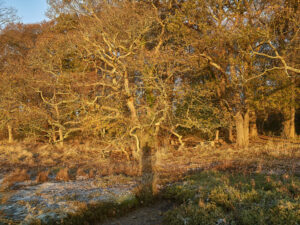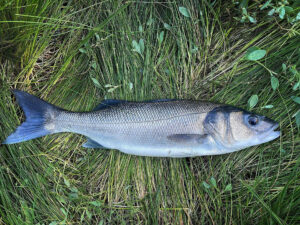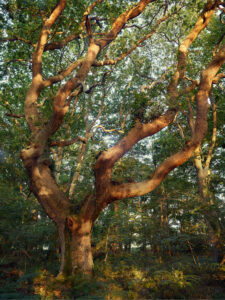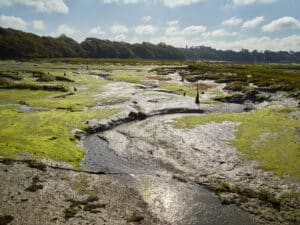Our cabin-in-the-woods correspondent reflects on a year of muttering to neighbours feathered, scaled, furred and cuticled.

I don’t drive. I often think of how much I would have missed if I did. I never wanted to. Not even after my first job — a summer sat on tractors during hay and straw baling. Having walked out of Grammar school at the end of the very last O level exam with a bounce returning to my tired Doc Martens at the thought of never having to go back. Getting the train the next day back to rural Oxfordshire. That I’d had to leave at my parents’ splitting a couple of years previously. To be back with my posse, in the fields by afternoon. Not even after jubilant joy rides. Like the night we discovered the old Land Rover at a very well spoken girl’s party. Her parents being ‘away for the weekend.’ To go churn up the fields, with a mad idiot riding shotgun — we found that too — on the bonnet, blasting at the scuts of rabbits caught in the headlamps. Not even after the adrenaline and euphoria of wheel burning escapes from rival village discos. Most of my country contemporaries had passed their tests as soon as they could. And, not even after returning to tractors, for a year on a fruit farm in a corner of Herefordshire, that autumn.
So I don’t drive to the cabin. Three years and still my shoulders rise. I’m floating two inches taller — like when I walked out of school — within five steps of leaving the train at the one horse station. Every time taking a deep breath, to gaze across ‘furze land’ towards the oak forest on the horizon, beyond which the cabin lies, and holding it, to listen, to smell, to stare. Feel the shit falling off. My head rejuvenated, burst open; imagination reactivated by happy trance train journey. Only walking gets close to a train ride. Wandering is wondering.
So I don’t have a car at the cabin. I remember my first shopping trip. I needed some bread, and fancied a bottle of Rioja. A three hour round trip across country. I dwelt on the fact that millions of people have to do this everyday, to survive. And how I thought of it as some serious schlep. And how the whole Thoreau, Walden, ‘A Life in the Woods’ is as much a middle class ‘back to nature’ privileged lifestyle trend (I’m lucidly aware of my fortune) as it is a profound reassessment of values. I shop every three to four days. If I want good bread, it’s to the village, if not, to the local supermarket. Either takes up the best part of a day. Is planned: weather, tide (fishing); route, depending on what I want to check up on, hope to see, or gather, or pick. And how much I’m willing carry. Every trip rewards. Whether some magical encounter or even if just the simple satisfaction of getting back. A full day well spent. Wandering is wondering. Priorities turned the right way up.

I remember the first time I muttered “no one’s going to believe this.” My dispatches were still just an idea, although I wrote notes constantly. One night, in the dark, I cast a lure to the mooring at the end of the jetty, a major bass hide up. It was hit within seconds with a massive thump. The sheer ferocity of an instant immovable force shocked me. Like nothing I’d ever encountered, no fish had ever felt like it, whatever the size. The only image in my head was, bizarrely, a net full of fish. It moved of its own fruition, shaking violently. I had no influence other than to hang on. It got caught up in the only possible snag, about ten meters out in waist deep water. I needed to free whatever it was. I ran back and waded out from the beach, recklessly into the total dark. Then there, in my head torch beam, Pisces made ferocious, spiked, armoured, silver, glinting flesh. The chance of two bass, of this size, hitting the same lure at the very same time has got to be beyond remote. I freed them from the snag, dragged them to the shallows, unhooked and returned them. Sodden with adrenaline and soaked from the waist down. My boots would take days to dry. The next day my gas ran out. And I felt liberated. The estate management sent a man with new gas days later. I remained barefoot despite my boots eventually drying. I reeked of smoke from my outside kitchen, the Kelly kettle and the wood burner. One evening I realised I’d only spoken about two dozen words to another person in two weeks. But muttered “no one’s going to believe this” to those whose activities, or appearances, were barely believable, many times.
This last year I’ve been muttering to my neighbours, my vie commune: feathered, scaled, furred; even cuticled, more than ever. It’s anthropomorphic. But why not? It’s delving deeper, connecting, synching. As a result of being present for weeks on end. Familiarity. Something profound and expansive happens seeing it all another way, beyond the cold gaze of rational scientific observation, with its assumptions. I can’t deny the characters I see, the names that come to mind for some of them. It’s not infantile, it’s empathy, imagination, that which children innately have, along with the wonder, the mystery, the possibilities, from absorbing the world from 360 degrees, before the prefrontal cortex reduces it all to edited data. It’s passing a threshold, diving down the rabbit hole, intelligence is imagination, creativity, it reflects the processes of the universe. Giving a creature a name, or character, acknowledges the detail, the closeness of observation, of its habits, body language, relationships. Any serious angler knows more about their quarry and its environment than any scientist studying the same subject. Devotees of J A Baker’s The Peregrine (count me, obviously) are aware of the doubt cast by some, even those devoted, over the absolute authenticity of the work. When I mutter “no one’s going to believe this” I think of that. I know different.

Every morning I wake up and look out at the ever-changing constant. At Golgotha the twisted oak rising precariously from the absolute boundary of forest and marsh. Golgotha as tree of life, and death; the full circle. Image of crucifixion, and winged Phoenix rising. Biblical symbolism paradoxically echoing new scientific thinking. Nature is female. Golgotha is old, most of her boughs gone, worn, matriarchal, in the morning. But in the setting sun: virile, still fertile, still young, erotic. In the energy of her twisted bole and out stretched broken boughs, I see dancer, angel, party girl, Iggy. Seeing it like this I notice the surrounding oaks reaching to touch her, reflecting the immense mycelial network that connects them, and themselves to everything else, in the unfathomably rich leaf mould beneath them, about which we know even less than the galaxy above them. Sure the tree is quecus robur (English oak) and life support to countless other life forms from columba oenas (stock dove) to andricus quercuscalicis (knopper gall wasp). Her fractal geometric lobed leaves, no two the same, photosynthesising, transferring thermodynamic energy. As a ‘fine specimen’ she is isolated and disconnected. Seen as Golgotha she becomes sentient, we are two sentient beings surrounded by sentient life, there is conversation, she is filling my imagination, I see so much more. I mumble, the leaves rustle, the acorns and galls tap “hey” on the roof and deck.
When I gave the-pheasant-who-doesn’t-take-off his name I didn’t realise immediately that I’d made an observation of evolution at work. He has seriously powerful wings. I once witnessed him displaying just a few meters from me, he hadn’t seen me sat still in the tangled understory. I watched and felt his wing blasts explode leaves all around his immensely ornate self. Yellow Foot the egret, to whom I’ve applied considerable anthropomorphism, can’t help it. I’ve never watched a particular species of anything so closely, the creature has so much character, and variety of habits and behaviour. I’m so not a twitcher and have never really visited anywhere to deliberately see a particular bird.

When I first came to the cabin in the woods, I never expected that I would be able to tell between a mullet’s and a bass’s bow wave, in tidal estuarine water whose surfaces I can now read like a book, two tides a day, a book of seven hundred and thirty pages. I knew nothing about bass despite being a life-long angler. I knew nothing about salt marshes apart from being able to identify things. I had to start from scratch. I never envisaged myself acknowledging and sharing with a fellow fisher in the form of an Osprey on a daily basis. Whom again I anthropomorphised and ultimately learned so much more about him. Then I never thought I’d see seals hunting mullet in a mighty oak canopy, or that I’d find myself in a forest fire of rain that left me in such a state of awe I felt like renegade android Roy Batty reciting his ‘Tears in Rain’ soliloquy in Bladerunner.
But they are all just fleeting moments. Experienced simply by being permanently present and fully immersed in this particular space for the last year. I know I would never have found places like this if I had learned to drive.
*
Mark Mattock. Artist. Photographer. Publisher. Rabbit Fighter. @the_rabbit_fighters_club